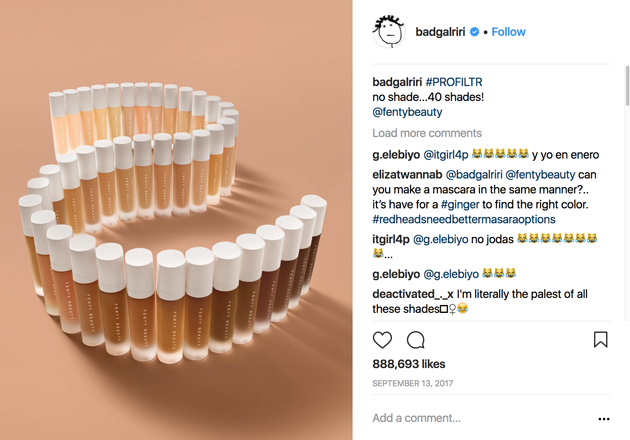Challenger to Watch: Fenty Beauty
For democratising beauty
The beauty industry was facing tumultuous times, even before Fenty Beauty, led by music and fashion icon Rihanna, exploded onto the scene last year.
Sales for independent makeup brands grew 42.7% in 2016, whilst traditional makeup sales declined 1.3%, according to Marc Rey, the President & CEO of Shiseido Americas, one of the world's largest cosmetics companies.
The figures demonstrate a significant shift in consumer purchasing behaviour. Whilst more makeup is being bought, consumers are moving away from the big brands, towards the small.
Whilst Fenty being considered part of these new independents is debatable, (Fenty is owned by Kendo Brands, a subsidiary of luxury conglomerate LVMH), what is not in doubt is the disruption Fenty has already caused the industry, being one of the most talked about brands of 2017.
“The primary brand narrative of Fenty is that of democratiser.”
With a range of ultra-inclusive products and some unlikely heroes in its communications, the primary brand narrative of Fenty is that of democratiser. Fenty is challenging an industry typically geared towards slim, light-skinned women, and making it accessible to all. Whatever colour, size, shape or sex.
Fenty's products are designed for use on all skin tones, from the very light to the very dark, and include shades that are traditionally hard to match. The 40 shades of foundation range has drawn widespread praise from the beauty and fashion press and on social media since launching in September.
“We've had this amazing emotional connection with customers who've never been able to find their shade of foundation before,” Rihanna told Vogue Magazine. “I mean like women crying at the counters, it is crazy."
An early sign that Fenty had put a dent in the industry was the quick response to its arrival from the incumbents. Just weeks after Fenty dropped '40 shades', L’Oreal and Estee Lauder launched their own new and expanded range of colours, which claimed to champion diversity.
The sponsored posts that suddenly followed from competitors also started to show much darker skin tones and swatches.
Imitation or flattery?
Whilst Rihanna is undoubtedly the brand’s biggest asset, rather than simply lend her superstar image and sizeable fan base to the brand, sources say she is integral to the business and part of the decision-making process. It's a degree of involvement which gives this challenger added authenticity.
“Fenty has given people access to a world they previously thought inaccessible.”
“The first woman I ever saw put makeup on her face was a black woman and that was my mom,” Rihanna said. “So when I'm thinking of my customer, that is one of my customers.” Consumer portraits evidently comes naturally to RiRi.
Consumers are responding because Fenty has given them access to a world they previously thought inaccessible.
Being a challenger brand is fundamentally about challenging people's perceptions of the world. What stronger example is there of this than an image search result for ‘beauty’ on Google now returning a bald, black model with orange eyebrows? Kudos.
Beauty is, of course, in the eye of the beholder. Perhaps Fenty is just giving us a sharp poke, as Dove once did, to remind us of that.


